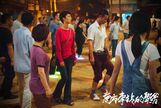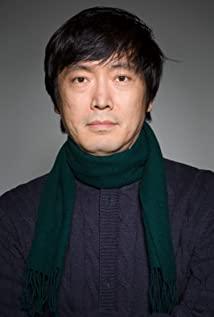Given the huge differences between the Berlin Film Festival version and the mainland release version of Fireworks by Daylight, I had to make similar associations with The Gathering at Southern Station.
To what extent does it retain Diao Yinan's original intention?
unknown.
From the currently known deletions, there is such a thing: after the fugitive Zhou Zenong played by Hu Ge was shot by the police, there was originally a plot where the police took turns standing beside the corpse to take pictures with V, but the public release version was deleted.
Can you imagine how it would feel if the version you watched kept this plot?
Even though it may be less than a minute of the scene, does it make you feel completely different?
I think how much it will.
This shot, which juxtaposes justice and death, victory and defeat, ends up blurring the lines between these concepts.
Is a person's death something to celebrate? Is this justice?
From this detail, we can get a glimpse of the repressed expression of "The Party at South Station".
Most people know Diao Yinan from "Fireworks in the Day".
This film won the Best Picture (Golden Bear Award) at the 64th Berlin Film Festival, and Liao Fan also won the Best Actor (Silver Bear Award) for this film.
For Chinese films in the 2010s, this is a rare international honor.
I really like Fireworks by Daylight, specifically the Berlin edition here.
The mainland release version cut this film into another film, completely lost the coldest and most ruthless part of the original film, and turned it into a love film that is cold on the outside and warm on the inside.
So what is the Berlin edition talking about?
In fact, it is a very cruel "people play people" story.
The film follows the film noir routine and tells that Zhang Zili, a coal factory security guard played by Liao Fan, tracks a case of dismembering a corpse, and encounters Wu Zhizhen, a female laundry worker played by Gui Lunmei.
The black of the film is double-sided.
On the one hand, Wu Zhizhen wanted to use Zhang Zili's infatuation to help him get out; on the other hand, Zhang Zili wanted to use Wu Zhizhen to solve the case and make meritorious deeds, so that he could return to the police force.
The man and the woman cheated each other and pushed each other.
At first, you thought that Wu Zhizhen played with Zhang Zili, but later you found out that Zhang Zili was more ruthless and played with Wu Zhizhen.
Unexpectedly, the most ruthless is still behind.
Zhang Zili's desire to return to the police force was ruthlessly broken, and everyone was played by the system.
So there was the last scene. When Wu Zhizhen was taken away by the police, Zhang Zili stood on the roof, lit fireworks, and fired at the police car.
Diao Yinan is black, cold, and ruthless, which can be seen.
It's no wonder that the English name of "Fireworks of the Day" is so straightforward: Black Coal, Thin Ice.
Black coal, thin ice.
In "The Party at South Station", this "people play people" structure still exists.
The "play" here refers to "information".
Zhou Zenong, played by Hu Ge, is a small leader of an electric car theft gang. Due to a turf dispute and a gang fight, Zhou Zenong was shot with a dark gun. In the rainy night, he accidentally killed the policeman by mistake, and had no choice but to go to the end of the world.
The film is divided into several branches, one is Zhou Zenong's escape route, the other is the story of Liu Ai'ai, the "accompanying swimmer", and the other is the process of the police arresting the murderer.
In the bright place, it is the wrestling of the police and the bandits. But in reality, the police are being led away throughout the story.
In the dark, there is a fight between people at the bottom.
Because of the money, because he could get a bonus of 300,000 yuan for telling the police about Zhou Zenong's movements, everyone betrayed each other for the money.
It was a tightly knitted "information chain", replacing the original bottom-level social network that still had a trace of warmth.
So we see that on the edge of the humid city in the south, in the night with neon flashing and ambiguous moonlight, the emotions of people are disintegrating inch by inch.
The wife informs the husband, the sister informs the younger brother, the friend informs the brother, the elder brother informs the younger brother...
Everyone is in danger, everyone is panicking.
Diao Yinan constantly used "sound" to intensify this chilling atmosphere . It was walking through a poor alley, and the loud noise of popcorn was heard from time to time; it was in a dilapidated furniture store, and suddenly there was a "bang" for no reason, and it fell. People's faces are covered with gray; it was walking on the street, not far away, a team of armed police rushed forward, shouting loudly, and ran over people nearby...
All the voices dragged this gloomy southern town further to the edge of the abyss.
It is like a zoo in the dark night, with Zhang Huang's eyes everywhere.
Those eyes, on the one hand, frightened, on the other hand, peeped at the prey.
As for Zhou Zenong, he was hiding in the places where these eyes were not covered for the time being.
He fought desperately to live in order to die more valuable.
He wants to escape everyone's pursuit, just to leave the opportunity to inform his wife, and to exchange his life for 300,000 yuan for his family.
So this story has been teasing the system from the very beginning. If we don't consider the subtitles added to the final act of the film, this story is actually telling a story of a desperate man who used the system to leave his family alive. .
Of course, this "teasing" is not because of "fun", but a desperate resistance.
When the institutions that monopolize violence and mobilize all forces to arrest a person who killed a police officer, when the entire bottom society is turned upside down, everyone is investigated, and no one is spared, the individual fleeing is so weak, he will eventually Falling under the muzzle, the only thing he can do is choose the way of death.
At this time, Liu Ai'ai appeared.
She is at the most fringe of society, doing the gray profession of "accompanying swimmers".
Because Zhou Zenong's wife was inconvenient to show up, she went to Nanfang Station to meet Zhou Zenong and complete the whistleblowing for his wife.
The "replacement" here is very ambiguous.
What role Liu Ai'ai is is the biggest suspense throughout the film.
This ambiguity is the best.
If you look at it with a warmer perspective, Liu Ai'ai escaped from the coercion of the gang, and finally fulfilled his long-cherished wish for Zhou Zenong. And the joy of the two on the boat is also Liu Aai's wife for Zhou Zenong, who gave him the last tenderness of his life.
But if you look at it another way, you notice the faint clues left by Diao Yinan, and regard Liu Ai'ai as a lily character (the clues are: neutral hairstyle, first meeting with Wan Qian inside and outside the cabinet, walking together at the end, etc.) , then the story will be very different, flipped in the other direction entirely. i.e. two females, who ended up "playing" with all the men.
The latter is obviously much blacker.
But in any case, what I like is the ambiguity that the film creates intentionally or unintentionally. This kind of ambiguity is like the night under the neon, which makes people unable to see or touch it, so it can contain a lot of unspoken thoughts and deceptions that are better not to say.
In this sense, "The Party at the South Station" gathers a group of ambiguous people.
There are police officers who do not necessarily represent justice, fugitives who are not necessarily full of evil, wives who are vague and reticent, and swimmers who have complicated thoughts and changed many times...
These people came to the station together, but none of them got on the train.
When you hear the singing of "Genghis Khan" and suddenly travel to Jia Zhangke's "Platform", you may also understand that this is just another story about the platform.
There is no distance, only the here and now.
They were all trapped people , like the woman in the shed where the beautiful snake was performing, the woman in the bottle that could sing, with only one head sticking out, breathing hard, unable to move.
I like "The Party at Southern Station", and I also think that Diao Yinan is a director who should be cherished.
Such films are not so unconventional or astonishing in the international arena, but in domestic films, there are very few.
Not only at the audiovisual language level, Diao Yinan has become more and more proficient. Since the completion of "Fireworks in the Day", he has been able to establish his own audiovisual system more consciously, using the lens to narrate, and creating an atmosphere through sound.
Moreover , the boldness of the film's expression, and the provocations that want to cover it up, are all rare courage.
A small essay, never finished.
I would like to dedicate this to another domestic film that could not be fully filmed.
View more about The Wild Goose Lake reviews











